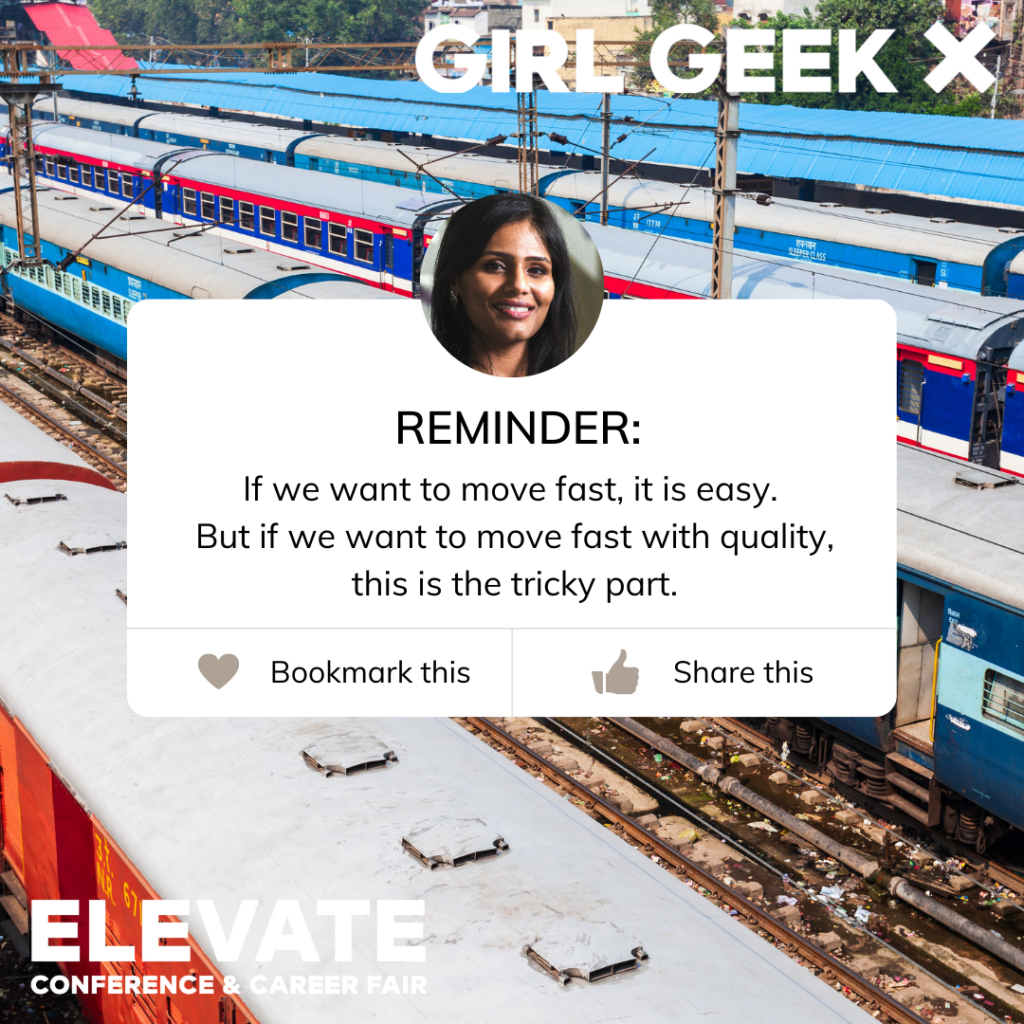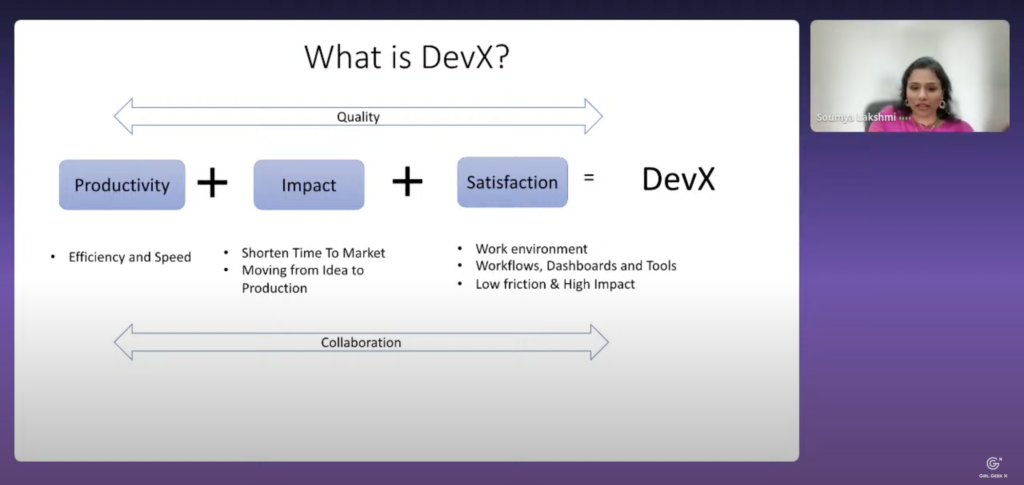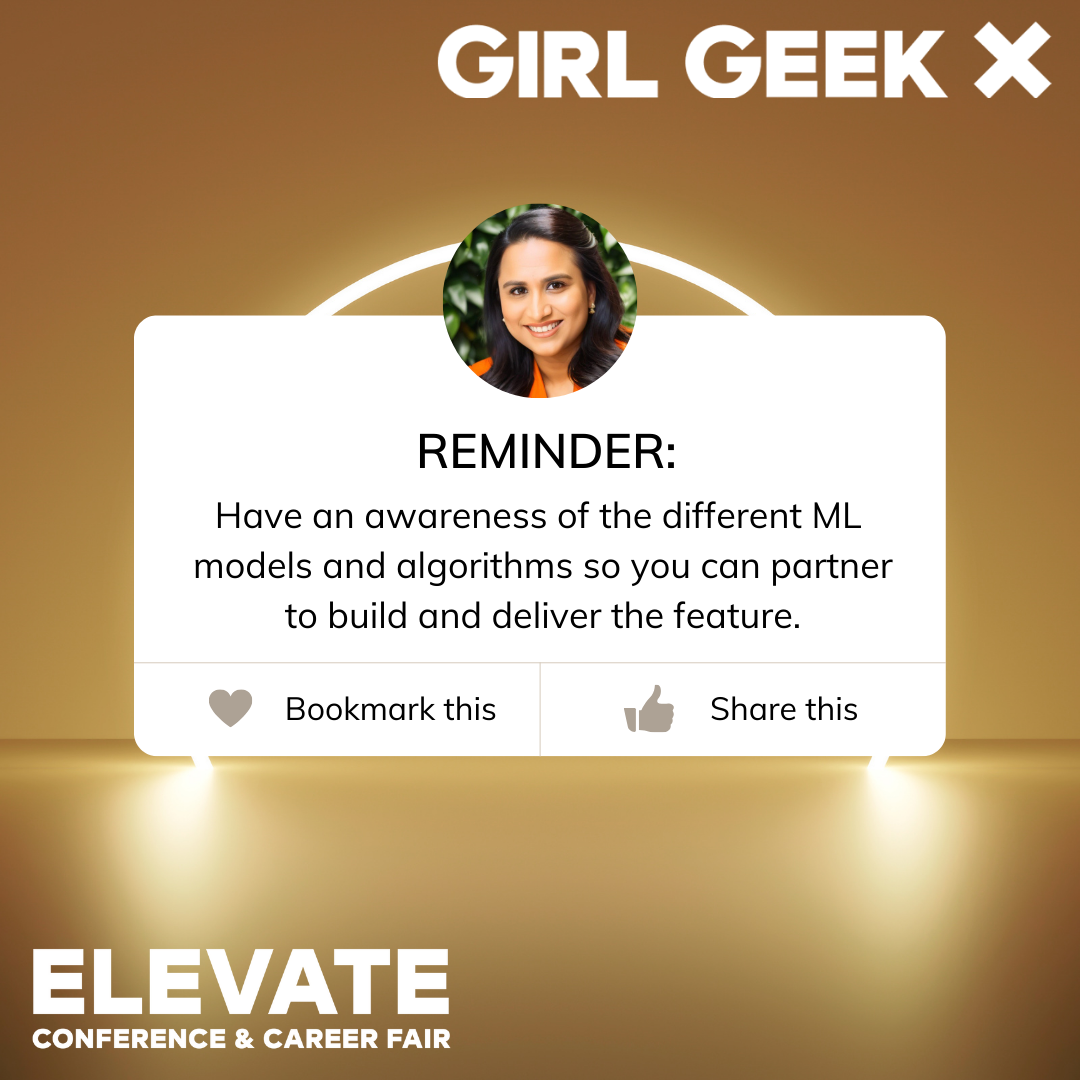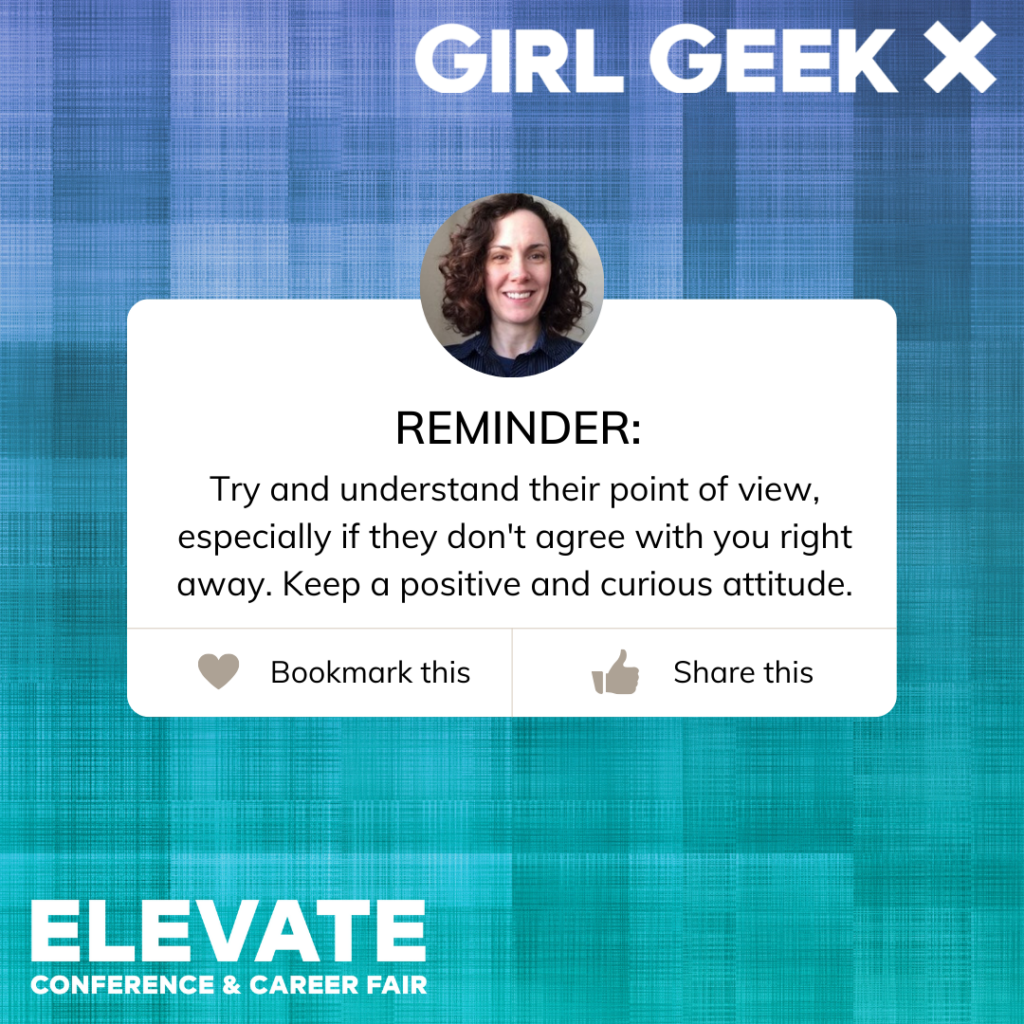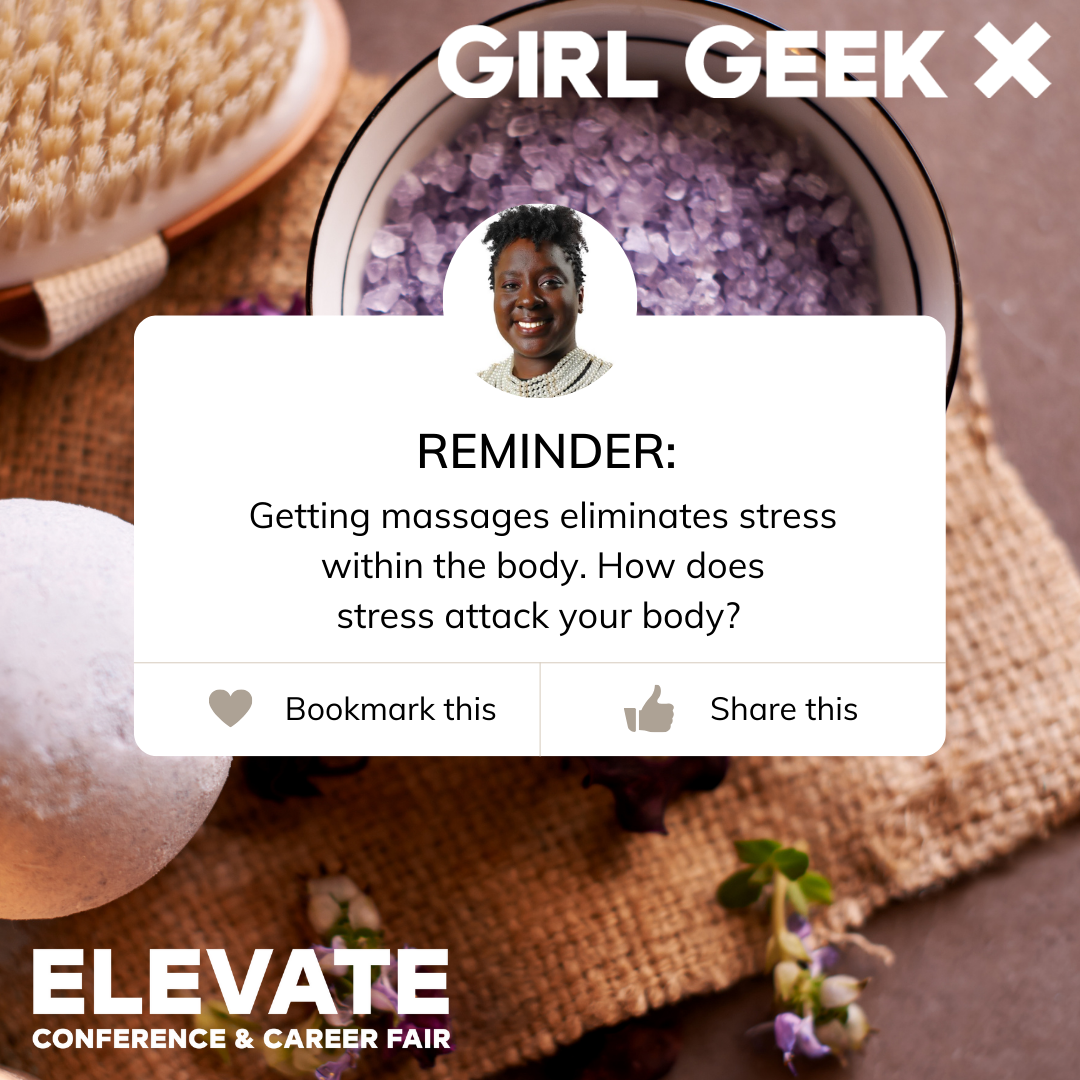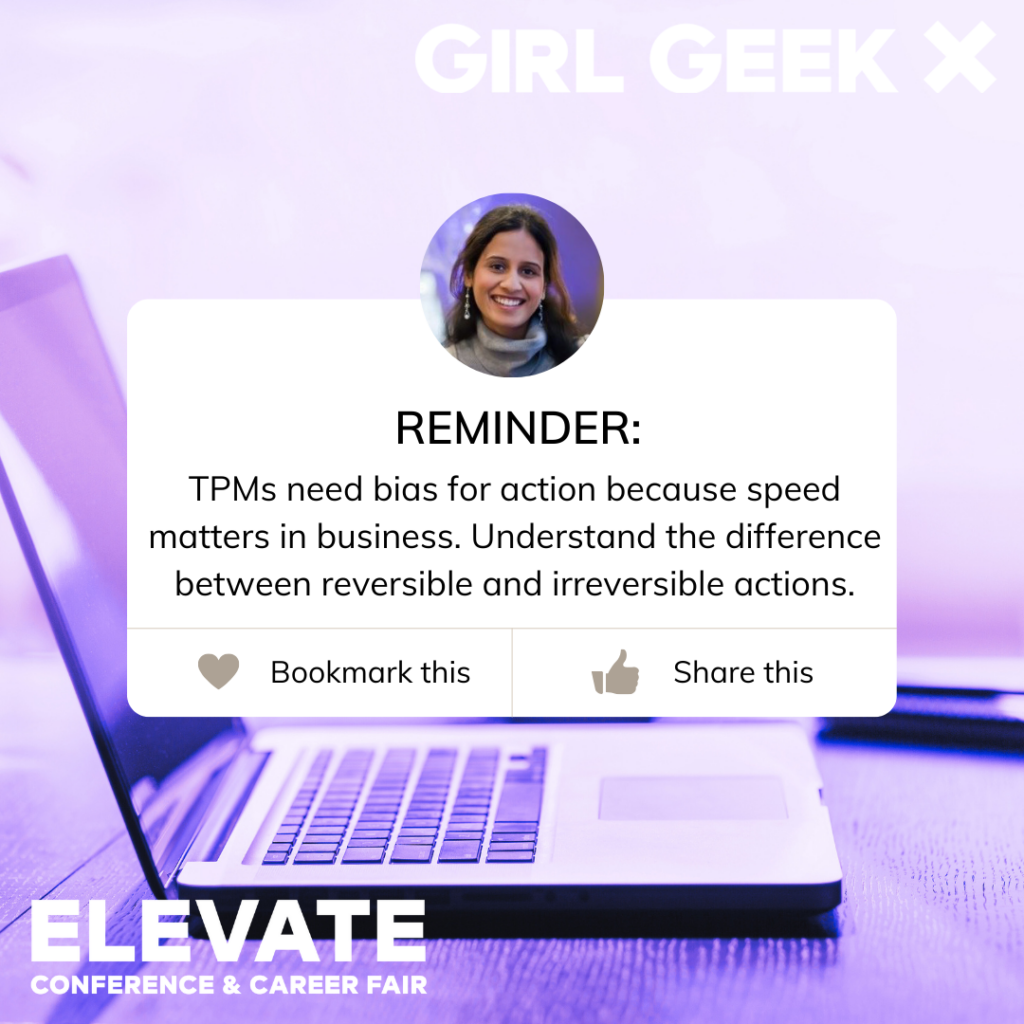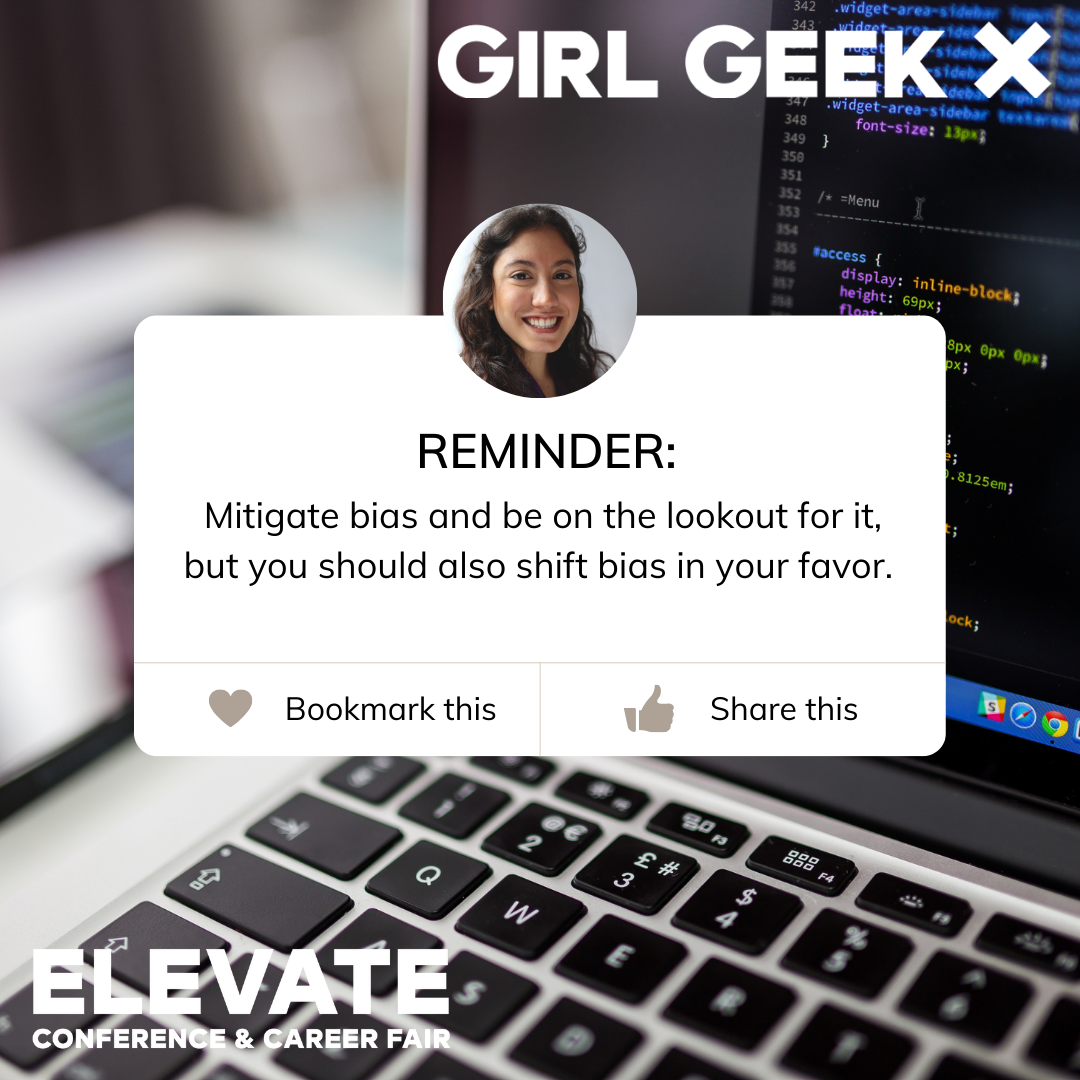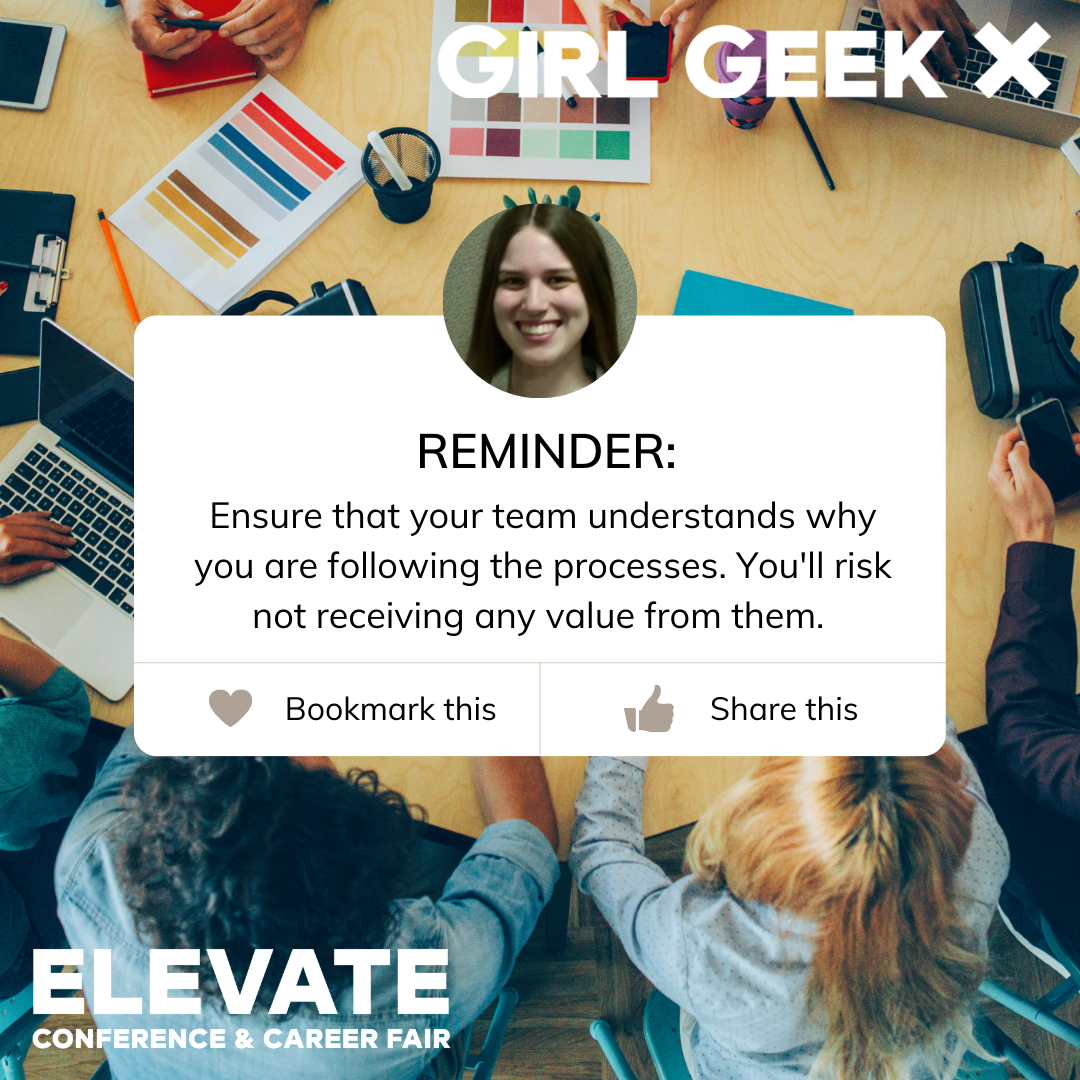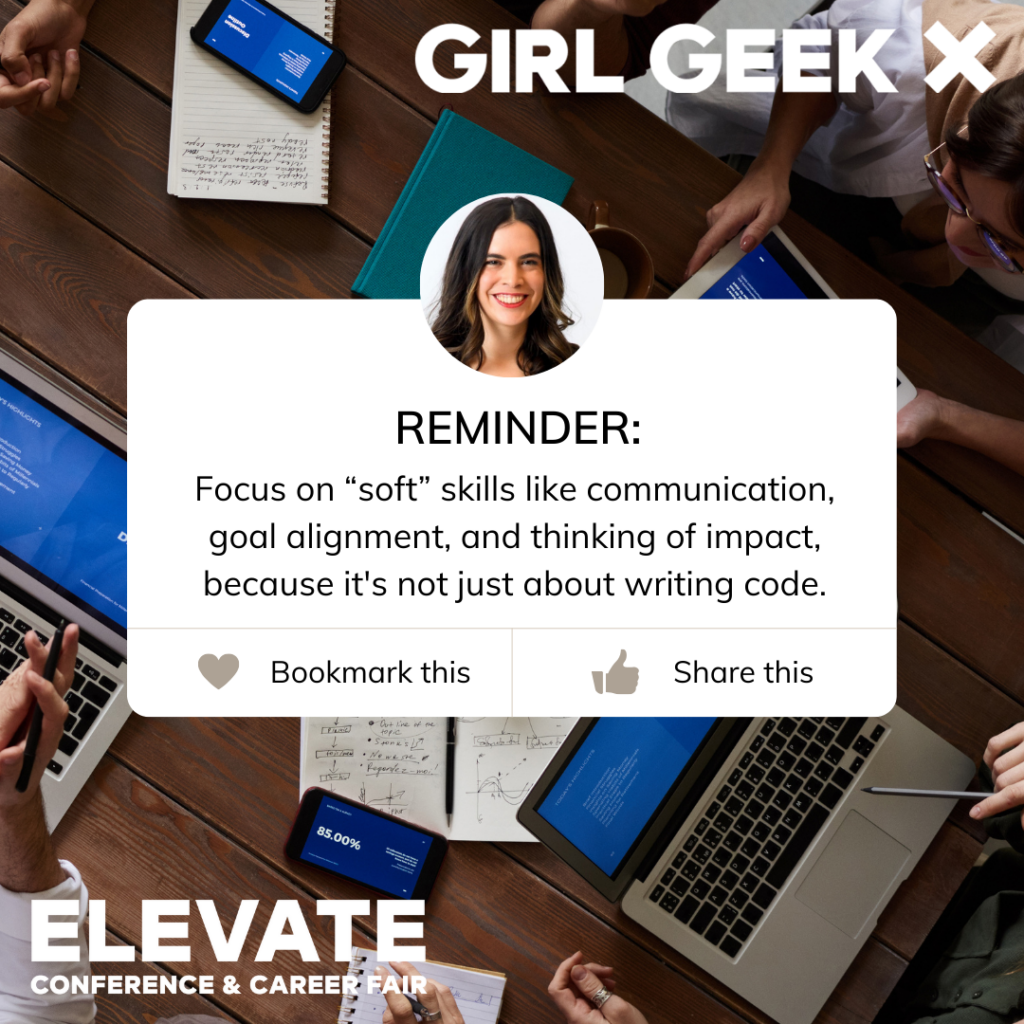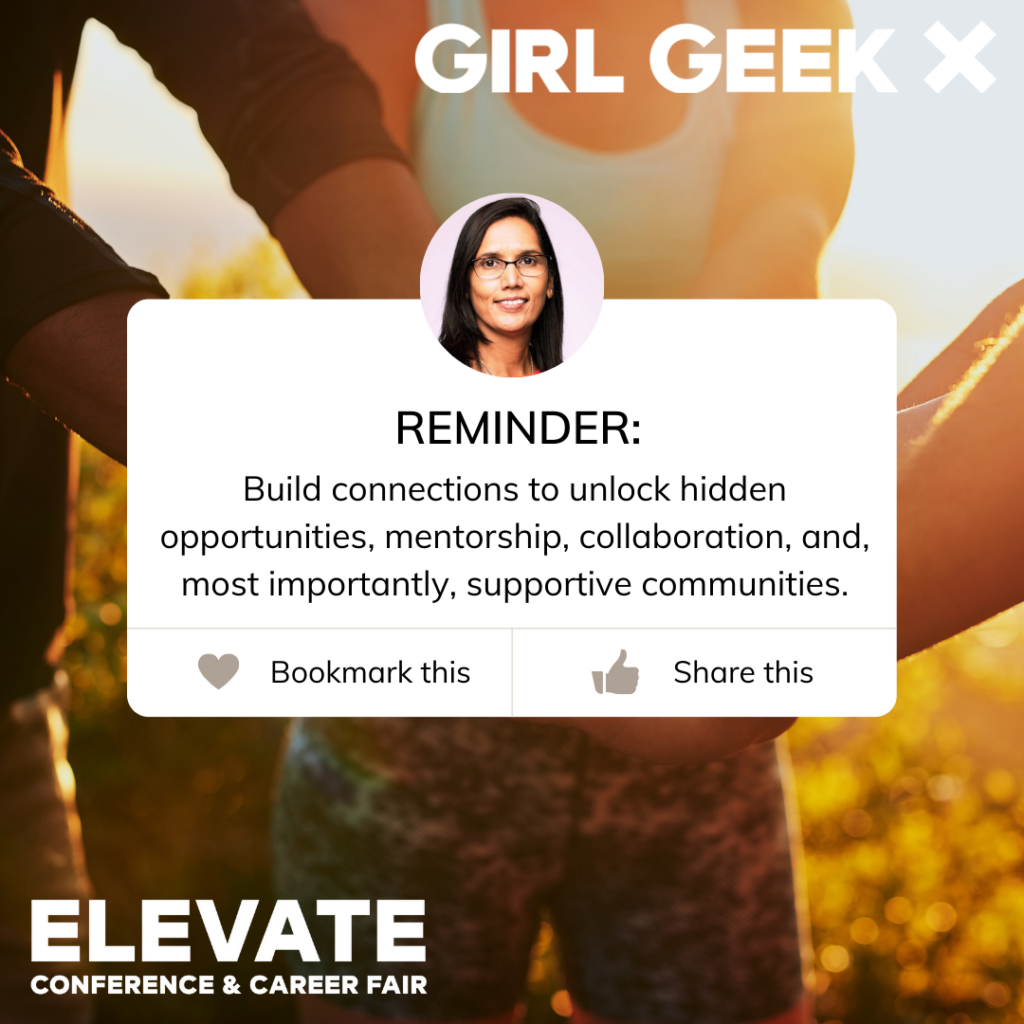In this ELEVATE session, Anran Li (Riot Games Engineering Manager), Jessica Burns (Boeing Data Scientist), and Brenda Garcia Lemus (YouTube Business Intelligence Analyst) answer questions about breaking into the field of data science, skills required for a business intelligence analyst role, and leveraging data in decision-making. They offer guidance on how to communicate effectively and tell a story with data, as well as what to do when the data contradicts what stakeholders want to hear.
Like what you see here? Our mission-aligned Girl Geek X partners are hiring!
- Check out open jobs at our trusted partner companies!
- Watch more ELEVATE 2024 videos from the event, or just the “Best Of 2024” Videos!
- Does your company want to sponsor a Girl Geek Dinner or Virtual Conference? Talk to us!
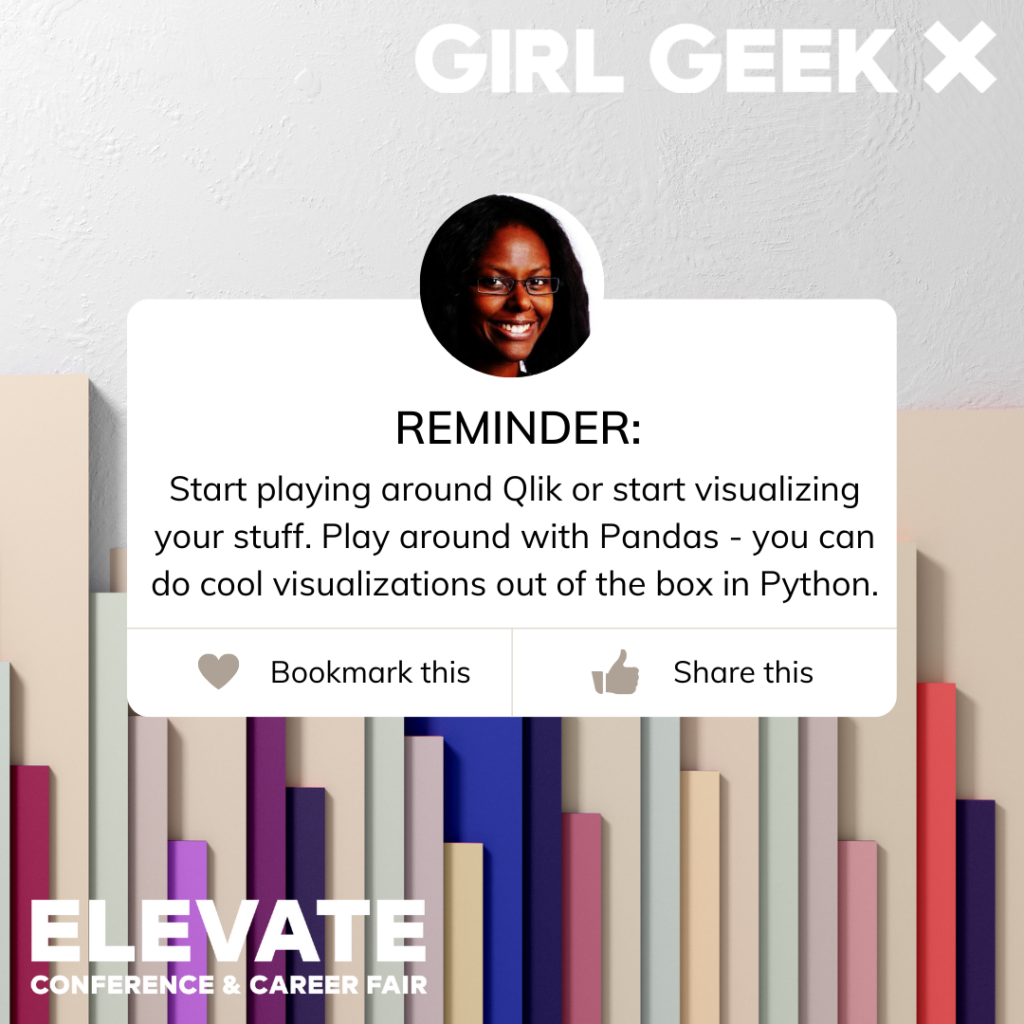
Transcript of ELEVATE Session:
Anran Li:
Hey everyone, I can get started. We’ll do introductions first. My name is Anran. I’m currently an engineering manager at Riot Games. We make games like League of Legends, Valorant, Teamfight Tactics. Yeah. Jessica, do you want to introduce yourself?
Jessica Burns:
Awesome. I love the popcorn methodology. My name is Jessica Burns. I’m a data scientist at the Boeing Company with the Boeing Global Services Division for Total Quality. I’m part of a pioneering data science team. I’m a co-lead for our team and I’ve done everything from finance all the way to software engineering at Amazon. Data science at Boeing. Career transitioner, Hackbright Academy alum, summer of 2015. Go 11 Zs. I’m very glad to be speaking with you guys today and let’s go ahead and hear from Brenda.
Brenda Garcia Lemus:
Thanks, Jessica. Hi everyone. I’m Brenda Garcia Lemus. I’m currently a business intelligence analyst at YouTube. I work in the YouTube business org, so I do a lot of data analysis and provide insights and automated ways or create dashboards for our business stakeholders so that they can make better decisions moving forward. And that’s it for me.
Anran Li:
Cool. Yeah, I can talk a little bit about my background as well for folks who are interested. I started off my career at Microsoft. I worked on the Halo games in particular. I worked on a lot their backend systems like matchmaking, skill ranks, also your profile and customization, things like that. I end up using data to leverage a lot of that job because skill ranking or how good you are, that’s all based on data, where we think you are compared to everyone else. Then we’ll slot you into are you bronze, are you silver, are you gold? Things like that.
After that I worked at Twitch on mostly commerce products. How do we help creators make money on the platform? Things like subscriptions, emotes, we built some things like hype trains or launched it to iOS. And we make decisions based on a lot of user data there. Like, Hey, how much money would a creator kind of usually make? How much do we think they’ll need to be able to sustain themselves and have streaming be their full-time job? What kind of products are we going to launch? Do we want to sell emotes? Do we want to just encourage the community to subscribe more? Sometimes it’s qualitative. We talk to streamers directly. What would be the biggest aid for you? What’s your biggest problems right now? What are some of their product ideas? They’ll have subscription goals and or follower goals, things like that and how can we support them?
Currently at Riot, I can’t talk too much about what I do. I work on the unreleased team, but I can probably, if folks have questions about League of Legends or Valorant and how they might use data, I can try to extrapolate based on what I know.
Jessica Burns:
Awesome. A little bit about what I do. I basically work with my team, and again, I can’t say a whole lot about what we do specifically, but a lot of it has to do with visualization as well as model creation and deployment for different kinds of quality solutions that will help with the end-to-end quality tracking process and compliance for aerospace. That’s primarily what me and my team do.
Plus we also create what is known as the central tower of data, so we’re kind of like a mix of data science, ML ops, data engineering, analytics. We run the gamut so we’re not just one thing. I know that there are some teams at Boeing that focus specifically on one, but we kind of capped out a mix of a lot of different things. Like right now I’m actually even working on a web app that interfaces with many different data sources to augment what wasn’t originally created with the original package that we got from a third party vendor to basically make that a little bit more robust for our senior level management and to basically increase transparency throughout the data pipeline process, and that goes from vendors, suppliers, and us all the way to our end customers at various airlines as well as our customers in the federal government.
Brenda Garcia Lemus:
That’s awesome, Jessica. Anran, for sharing, I can talk a little bit more about my background and a little bit about my current role and my journey to get here. I transitioned to data related roles after working as a research analyst in the consulting field. During my time as a research analyst, I started to work with data, and this experience really crystallized my passion for data analytics.
My first pure database role started at a policy think tank and then I transitioned into data roles in the entertainment industry at Disney and now in tech at YouTube. I do think my education helped make the transition a little easier because I did econ but specialized in stats and econometrics, so that definitely helped.
I do think doing individual learning also helped. Learning SQL on my own was something that I had to pick up, and then also Python. I think that’s how I went to where I am today.
Jessica Burns:
That is awesome. Thank you so much. Brenda. Should we go ahead and get into some of the Q and A?
Anran Li:
Yeah, that sounds great.
Jessica Burns:
Awesome. Gianna, and I hope I’m saying your name properly, says I’ve been in tech and HR tech for almost 20 years and I want to get into data science. I started classes, but trying to figure out how I break into a new field this far into my field, I think she means career. Any suggestions? Who wants to start? Okay, I think I’ll go ahead and start then.
I’m a career transitioner as well. Like I said, I used to be in finance for a long time. I was a business and planning analyst. I was an estimating and pricing specialist. I was a senior estimator for a long time. I was in procurement financial analysis. And so I would say one of the things that really helped was in your own space where you are try to apply data science or at least data methodologies to whatever it is that you’re doing.
Basically, taking a more data focused approach to whatever it is that you do will position you to have transferable skills within your niche. Because I don’t consider myself just a data scientist. I do have an entire career behind me that is where I understand financials as well. I’ve been in high finance at Smith Barney that doesn’t just magically poof away with my transition into more of the engineering side, same with my entire decade plus of experience in accounting.
I mean, I am a data scientist plus, and so you would basically be data science plus HR, and that’s a very valuable thing to have is going deep into a niche is actually really where it’s at. Whatever you can do, start playing around with things like Qlik or start visualizing your stuff. I don’t know if everyone here is familiar with pandas, you can play around with it. You can do some really cool visualizations out of the box in Python. Starting to do that sort of thing first and then saying, okay, well I do have the track record. I have been working with things I know how to think in terms of strings, in terms of cleaning the data, in terms of thinking about edge cases, that sort of thing.
You can do what you’re doing right now, your own domain, but you can add this additional skill. In fact, that’s why I decided to do this was because I was tired of waiting for, I would write things that would break Excel, and so I was basically waiting for Microsoft to either come out with a new version or I needed new tools.
That’s why I decided to go to Hackbright and I came out of Hackbright learning Python, and I didn’t need to have the shackles of Excel or any other Microsoft product because I had different libraries that could accommodate those things. Then I could also augment my data with other data sources for additional insights that might be beyond the confines of my organization or my team. Brenda or Anran?
Brenda Garcia Lemus:
Yeah, I also transitioned into data science. I studied econ both in undergrad and grad school. I did specialize in stats, so that helped, but I definitely had to do a lot of on my own learning. It helps if you jump into different sites, there’s so many resources, including free ones to really supplement your skills, like SQL, Python, R, and also building a portfolio really helps, especially if you don’t have any experience in data analytics or data science, just so that you can showcase like, “Hey, I can actually do this stuff.”
Then, just being resilient because when I first wanted to break into data analytics, I got a lot of rejections to be honest, a lot of rejections, and you just need one open door and you just sneak your way in there and then just keep proving them that, yes, I can do this. As you gain more experience, it’ll be easier to transition into the industry that you want, but definitely, being flexible and open I think would be my recommendations.
Anran Li:
Yeah, definitely. Plus one to everything Jessica and Brenda said. I think on one side, trying to find data related things to do at your current role is a great idea. Same for Brenda of studying SQL or R or a lot of the technical tools that they’ll be using. One thing is, even though I’m in the engineering role and we have data analysts and scientists that support things I do. As part of my job, it’s really important to actually just go in there, look at the data, I’ll do SQL queries to find patterns and stuff. They’ll do presentations. It’s very important for me to understand what it means. One thing if you’re in HR specifically because I’m a hiring manager, I use tools like Greenhouse and they even have some data things on that backend. And one thing that I was interested in is how do we create a more diverse pipeline?
I went into some of their backend and I tried being like, what type of candidates do we usually get? How far do they make it through the pipeline? Then I created and ended up exporting some of that to Excel and coming up with a strategy and presenting it to some of the leaders in my org and some ways of running interviews to be like, Hey, look, it looks like if we just do first round screens instead of a phone interview, if we just have them do a test, we end up getting more diverse candidates, through the pipeline that way. And the quality we indicated the quality is not actually lower. Things like that.
You could try to find neat side projects in your role. Think about data as in every company uses it a little bit differently. I’m like, that’s a HR application. There’s some very deep AI machine learning type of applications that’s probably a little bit harder to get into. I helped Microsoft develop their true skill to algorithm or I helped them build it. I am like, I’m not smart enough with math and all that sort of stuff to help them create the algorithm. But that’s going to be a harder area to get into where you’re like, oh, ML is able to look at all things like how to kills or deaths or other actions that happen in Halo. You run a big query every nightly job and you change everyone’s–tunes everyone’s MMRs based on that, and it develops an algorithm for what they think are important heuristics that go into it. That is very advanced stuff. There’s also simpler things, like right now a lot of gaming companies, they play test a lot and every day.
And some of that is you’re bringing a bunch of play testers. You think about what type of questions like, is this game fun? How does the experience of going into this menu feel like? And a lot of that might be a little bit more qualitative data, but then that requires you to know a little bit more about your subject matter expert of what type of game is this, what makes this fun? Is it League of Legends?
If it’s more like the big moments or the outplays that really make it fun versus in Valorant might be more shooting base is the mechanic of shooting actually fun, is the macro strategy fun? I think data and if you think about it from that point of view, can be applied to a lot of different things. Also think about what you know and where you can bring value there.
Jessica Burns:
And just a quick follow up to that. It’s also helpful not to just think about it in terms of your job because I actually got my first titled data science job, even though I’ve been doing it for a while, while I was volunteering.
I was volunteering for a 501(c)(3), the Washington Technology Industry Association, and I was helping them with some of their advertising spin strategies as well as outreach to veterans. That was a volunteer position, so if there’s a cause or a charity that you think is worthwhile, consider doing some work with them to help them better optimize their limited resources as well as gain skills and get that valuable experience. You can do that as well.
Or even think about if you’re in school, you can do school projects or personal projects as well. It doesn’t necessarily have to be in your job. There are other opportunities for that as well.
Want to go to the next question that’s been asked. All right. We have Reolan, I’m sorry, Reolan asks, do you have any favorite projects that you have worked on, whether for your jobs or personal projects? Brenda, do you have a favorite one?
Brenda Garcia Lemus:
Yeah, so I think one of my favorite projects that I ever worked on was back when I was at Disney. I had to dive into data to give producers of shows a comprehensive view of how a specific TV show was doing, all with the goal, of course, of making it better. I thought it was really fun. It was like playing data detective to try to uncover what parts of the show were doing well, where we were retaining the audience better and then providing those insights to the producers. I thought it was really fun. It was a show I enjoyed watching, so doing the data work on it was pretty fun. What about you, Jessica or Anran, have favorite projects?
Anran Li:
Yeah, I can speak to it. So one of my favorite projects was I made the emote card at Twitch. There’s emotes in chat. If you click on it, a little card pops up, it tells you what the emote name is, what streamer it’s from, and all their other emotes, and you can go to their channel or subscribe. What came from that is we had this theory that folks might want to purchase emotes, but instead of just building a direct purchase, let’s do it in between stuff that’s a little bit easier, but it’s also helpful for folks to discover new streamers and things like that.
It’s cool. It came out of a hackathon project, it’s front end backend, all that sort of thing. What we ended up actually finding out is there is a subscribe button. You’re almost like, oh, if they like the emote, they’re subscribing and they can purchase the emotes. We learned that it did help discoverability for other channels. That’s great for the community, but folks did not really want to subscribe or pay for emotes except for AdmiralBahroo. He has those really cute panda emotes. His subscriptions went through the roof and then it barely affected anyone else’s, but he does have really, really good emotes.
Jessica Burns:
That is so cool. Oh my goodness. Wow. Actually, one of my favorite personal projects that I’ve worked on was actually a data and art combination, and I can go ahead and share you guys with you guys what I did. Let me go ahead and present share screen. Let’s see here. Here we are. This is actually a thing that I did during the pandemic, during the George Floyd protests that were going on. There were some songs that really spoke to me. And so I created this kind of this Cypher model.
Cypher is basically a product, or sorry, is a language, it’s a query language that is used with Neo4j, which is basically a graph database. And so I would take the songs of some things that I thought were really poignant and spoke to the moment, and then created a graph of the songs and the people who actually sang them.
I then was able to visualize how these different groups come together. I specifically found that there’s a really strong relationship between Run the Jewels, which is one of my favorite groups, and another one of my favorite groups Rage Against the Machine. And so I took that and I started working on, I kind of superimposing that on some images that I found that I thought were very poignant and spoke to the time as well.
I would go and also use Photoshop to create what were essentially image masks that I would then map the lyrics onto. And these are some of the final results was like this walking in the snow lyrics for, and these are actually word clouds. Basically we have to play with the interpolation, the way it lays out and everything like that. And I thought that it was a way for me to uniquely express my voice using the ethos of the moment and popular media to express how I was feeling about the conversation that the nation was having at the time.
This is a project that is very near and dear to my heart. It actually ended out a little bit better than I thought it would be. And I got to play around with working with language data, natural language and learning, taking a crash course in some stuff for related to Photoshop as well as Python tools to help automate this. This is some of my very favorite work that I’ve done just personally with data and storytelling from that regard, using data to just tell stories and to express yourself because it’s not just cut and dry. It can be many things.
Anran Li:
Yeah, that’s super cool. Jessica, I also really love that you were just passionate about it and just did it as a side projects.
Jessica Burns:
We have a question for Brenda. I have a question for Brenda. I’m looking for jobs in BI analyst role. Other than the skills you mentioned, what skills are required to get an entry into this role? What should one do to make the profile stand out more?
Brenda Garcia Lemus:
Yeah, I think that’s a really great question. I think BI analyst is an interesting role. You’re a little bit of everything. Sometimes in a way you have to create dashboards. As part of my role, I’m doing some of the data engineering pieces. I definitely think it’s good to have the core skills, for example, have very, very strong SQL skills. That definitely helps prepping for interviews and then doing a lot of practice problems just to get in the door. But
Another really valuable skill is also having some UX design background for creating helpful dashboards. I think that’s something that has definitely helped me succeed in a BI role is not just being able to have data dumps, but also being able to tell a good story through dashboards and make them user-friendly and also actionable. It helps to get familiar with the domain that you are trying to go to because it does help to have some business context.
For example, here at YouTube, it definitely helps to have background in how a little bit of media works and also how tech works and streaming and all of that. But if let’s say you’re going into healthcare as a business intelligence analyst, it definitely helps if you have some background in that as well.
It really depends on what area or what industry you’re trying to go into. And one way you could showcase this is maybe doing a personal project with publicly available data on that specific area that you’re trying to enter. For example, if you want to go into healthcare, maybe find some open source data sets and then putting together a dashboard, a data pipeline so that you can talk to recruiters and also during the interview process about this and how it would apply to your role.
That’s what I would recommend doing. And also, presentation skills are very valuable, so being able to communicate effectively and explaining your metrics, explaining the dashboard and how it can be used really helps.
Jessica Burns:
Storytelling is so important because a lot of places, data is new to them or they’re just trying to figure out how to leverage their data. So you’ll get a lot of requests for, hey, make me a dashboard, and then they’ll keep adding to it and adding to it and adding to it and adding to it. And at the very end, it’s basically just this big mess of data and it’s like, okay, well is this a call to action? What am I supposed to do with this?
Being able to help, having experience with not just how to get the data and bring it together, but how to craft it in a way that tells an actionable story that isn’t just like, okay, well here’s our sales from the last five years, but hey, maybe this one’s not a great seller. Let’s go something else. You need to be able to tell that story. Or, Hey, let’s stop doing this and start doing this.
That will basically put you a cut above the rest because a lot of people will just put a bunch of numbers up on the screen and be like, okay, we’re done. But there’s a lot of value there.
Anran Li:
The next question, if folks were in denial about a problem, have you leveraged logic or data over the hearts and minds of your teams and leaders, asked by Cassandra?
Jessica Burns:
Sometimes data can produce situations where you might have to express unpopular opinions. Data is political by its very nature. A lot of people will try to use data to either prove their point or disprove a point that they think is not correct. And if the data goes against that, then that can produce some very uncomfortable situations.
I know that when I was volunteering at the Washington Technology Institute, they have a technical assessment online that all the applicants take in order to see if they were going to get an apprenticeship at, say an Amazon or a Microsoft. I was like, okay, well, it looks like we have a pretty good bell shaped curve throughout the reading comprehension and the math portion. However, the soft skills, that’s where you’re saying is your competitive advantage where you have an edge over everyone. That is basically a single data point because most people know not to yell at somebody if they’re asking for a refund or something.
And that’s the kind of questions that people were having to answer. And I showed them on a chart compared to the other sections that was really not yielding any valuable statistically relevant differentiation. I said, you guys have to go back and raise that entire section, go back to the question bank and try to create something that is more rigorous, that is not nearly as intuitive and to basically that will answer that mail, but that will also yield results that actually are useful for your end goal.
Watching their eyes, the board of director’s eyes, while they saw that chart with just the sharp up down because most people knew exactly how to answer that was very, very valuable. And you also have to think about your audience. So you don’t want to embarrass your audience if it’s potentially going to be embarrassing for them or if they have a stake. You really want to also think about how you socialize it with people beforehand and so that it’s not like a bomb dropped on them where they’re just like, we don’t want to talk to her anymore because she’s politically dangerous or whatever. Yeah, there’s that.
Brenda Garcia Lemus:
Yeah, I totally agree that especially when you have to deliver not such good news with data, it can definitely be a very challenging experience. But I think it also really depends on the culture of your company, of your board, of how open they are to listening to data insights versus their own opinions and instincts. I definitely do think you have to keep that in mind, what kind of organization you’re working in, what kind of company you’re working in, and how they will take these answers. I do think that it’s still very important to present these findings, but I think what kind of helps soften the blow sometimes is to provide potential solutions. If you suggest this isn’t working, okay, if that’s not working, then what is working? That really helps to end things in a good note.
Anran Li:
Yeah, thanks. Yeah, while they were discussing their opinions, I was trying to think of a good maybe example for some of this. But yeah, I think in tech companies, we do a lot of AB testing. You launch multiple versions or multiple UIs of the same product. It’d be like, which one’s a little bit better? One kind of interesting thing I worked on was new players on Halo. We think we kind of set you at the average rating, but then there’s this hypothesis, yeah, I’m the first time playing a Halo game. I don’t know what I’m doing. Can I even move in the game? Who knows? I’m probably much worse than average. And then so we did a test where we kind of lowered folks’ average to see if they’ll have a better experience, and then we tracked retention slash engagement, how long you played and how often you played.
And then obviously we also tracked just kind of monetization metrics, how often do you purchase cosmetics and other such things in the game. But it’s interesting because I respected the culture there a lot that it did actually say that, Hey, I think new players have a better experience. They’ll engage for longer if you lower the threshold for new players. But actually the money metrics went down by a tiny bit, but the designer was actually like, Hey, I actually think it’s better for us to veer towards a better player experience because we also only ran this test over a month. He’s like, I think all that metrics will probably go up after that. It’s better for us to just like, if you like this game and you’ll play it for longer, you’re probably more likely to purchase things in the end, right. So yeah, that was really cool decision that was made.
Jessica Burns:
I suppose we can go to another question. How was…Miriam, I’m sorry, asks, how was the interview experience into getting into YouTube and other big tech companies? Do you do heavy, medium, advanced lead code prep. As a career transitioner, I find advanced algorithms of big bottleneck to getting into big tech companies. Why don’t we start with the person at YouTube?
Brenda Garcia Lemus:
Yeah, thanks Jessica. Yeah, I do think it is a commitment if you do want to apply for big tech, it is a big investment. I’m not going to lie in terms of prep, you will have to prep for months and the interview process themselves can take months. I have interviewed with Meta, with Amazon, with Google and all of them. I think Amazon’s probably the fastest one, but the other two can take months just to go through the interview process and you’re going to have to go through three, four, maybe even five rounds. So I do think it is an investment that you have to be willing to make, and it really depends on the role. If for example, you’re going for a BI role, I do think your SQL skills need to be advanced. Otherwise it’ll be very, very hard to get through the technical interview if you want to be a data scientist.
I would say also Python and R are absolutely crucial and they have to be at least medium capacity. So I think it is a commitment, but I do think if you practice, you get better. When I first interviewed with Amazon, I got rejected right away. And so it’s just having the ability to get up and go like, okay, I’m going to be sad for a day, but I’m just going to keep going and not let that stop me. So having…they say, practice makes perfect. So the more you practice, you can look at these interviews as another opportunity to practice.
Angie Chang:
Thank you for sharing your insights on data science, data engineering, and being an engineering manager in tech. This is really illuminating. I love hearing conversations about how to get started, how to find that next job, how to showcase your skills, how to learn more. Thank you so much for sharing these resources or in the chat, and we’ll be moving on to the next session now. Thank you.
Jessica Burns:
Just know that you belong here always.
Like what you see here? Our mission-aligned Girl Geek X partners are hiring!
- Check out open jobs at our trusted partner companies!
- Watch more ELEVATE 2024 videos from the event, or just the “Best Of 2024” Videos!
- Does your company want to sponsor a Girl Geek Dinner or Virtual Conference? Talk to us!


